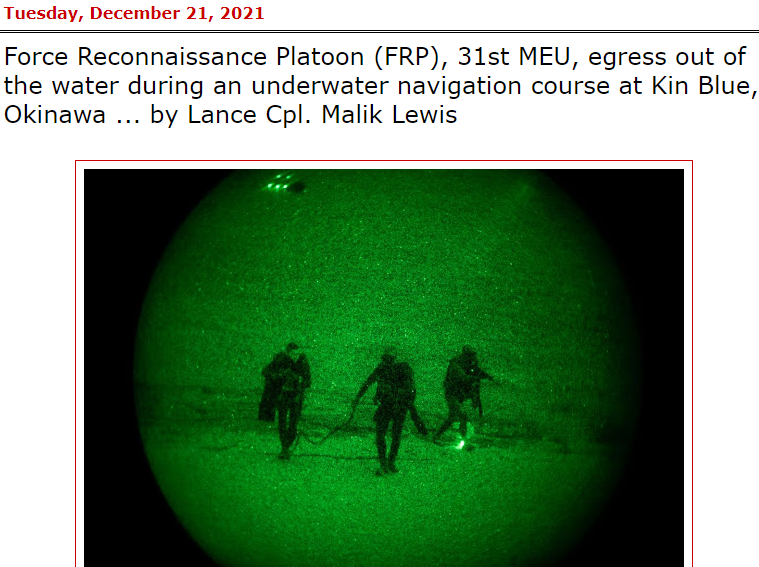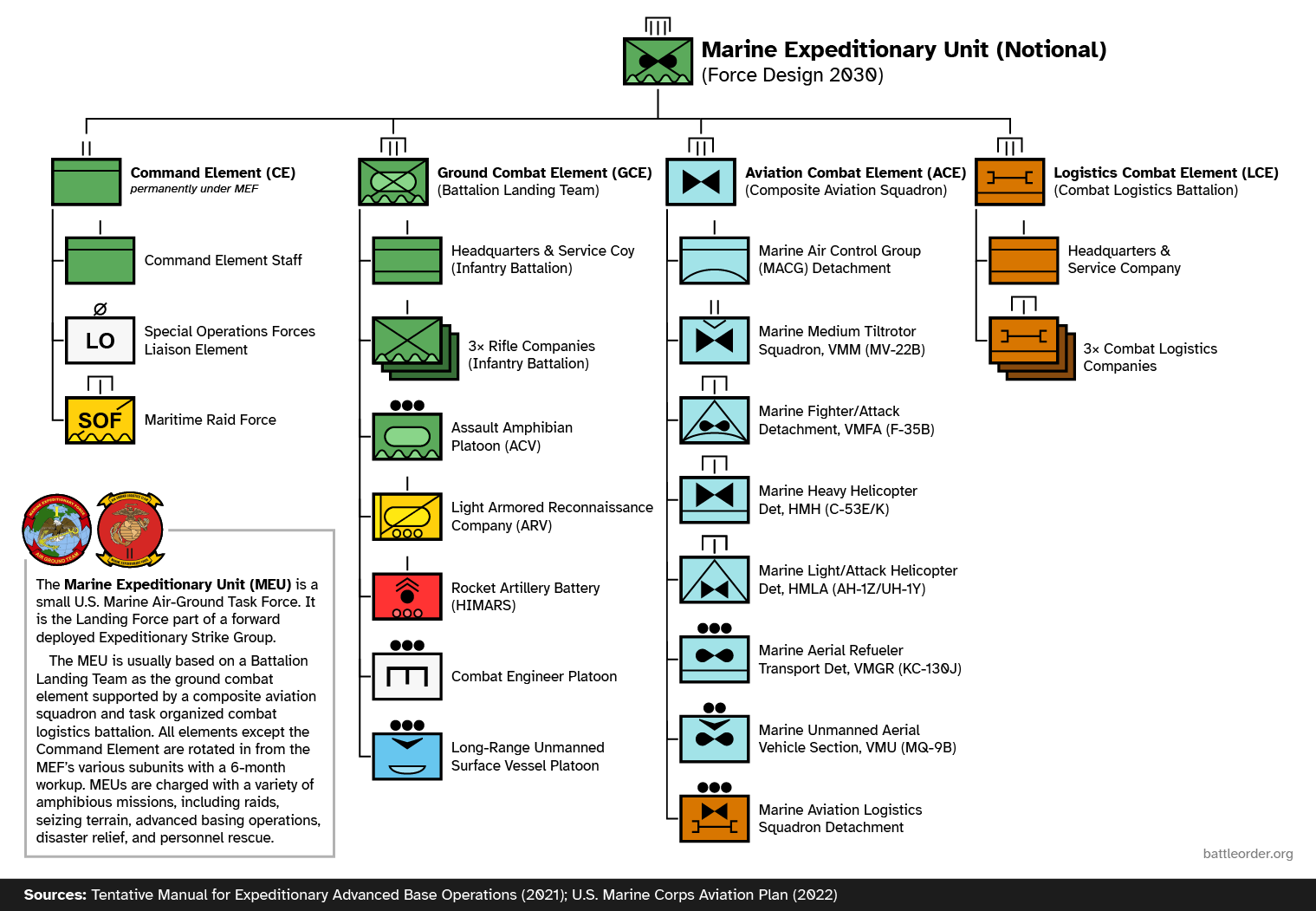Corpo de Fuzileiros (MUNDO)
Moderador: Conselho de Moderação
- cabeça de martelo
- Sênior

- Mensagens: 39574
- Registrado em: Sex Out 21, 2005 10:45 am
- Localização: Portugal
- Agradeceu: 1139 vezes
- Agradeceram: 2862 vezes
Re: Corpo de Fuzileiros (MUNDO)
Até aqui os Fuzileiros Norte-Americanos quando iam para a sua Escola de Infantaria tinahm várias sub-especialidades (Atiradores, Morteiros, etc). A partir de agora vão fazer um curso mais longo e generalista que lhes permite cumprir qualquer dessas funções.
- cabeça de martelo
- Sênior

- Mensagens: 39574
- Registrado em: Sex Out 21, 2005 10:45 am
- Localização: Portugal
- Agradeceu: 1139 vezes
- Agradeceram: 2862 vezes
Re: Corpo de Fuzileiros (MUNDO)
magliano escreveu: ↑Seg Abr 19, 2021 1:54 pm Portugual:
https://www.naval.com.br/blog/2021/04/1 ... -400-anos/
- cabeça de martelo
- Sênior

- Mensagens: 39574
- Registrado em: Sex Out 21, 2005 10:45 am
- Localização: Portugal
- Agradeceu: 1139 vezes
- Agradeceram: 2862 vezes
Re: Corpo de Fuzileiros (MUNDO)
TENTATIVE MANUAL FOR EXPEDITIONARY ADVANCED BASE OPERATIONS
 https://assets.documentcloud.org/docume ... 210211.pdf
https://assets.documentcloud.org/docume ... 210211.pdf
- Frederico Vitor
- Sênior

- Mensagens: 2064
- Registrado em: Ter Ago 14, 2007 1:34 pm
- Localização: Goiás
- Agradeceu: 206 vezes
- Agradeceram: 270 vezes
- cabeça de martelo
- Sênior

- Mensagens: 39574
- Registrado em: Sex Out 21, 2005 10:45 am
- Localização: Portugal
- Agradeceu: 1139 vezes
- Agradeceram: 2862 vezes
Re: Corpo de Fuzileiros (MUNDO)
Here are some big changes that may be coming to the Marine Corps
Todd South
The Marine Corps’ second round of changes to how it fights shows moves in command, aviation, logistics and ground combat and shifts that might see stateside Marine reservists operating drones for active units overseas, ditching weapons companies from infantry battalions, and a host of other moves.
Those are some highlights of what Marine Corps leaders unveiled recently to media with a Force Design 2030 annual update.
The service’s first announcement in 2020 made sweeping changes that included shedding tanks from the ranks, swapping loads of conventional artillery for rockets and reducing the overall manpower from its 2020 level of 186,000 to 174,000 by 2030.
In the 2021 update, the Corps reviewed decisions leadership already has made, laid out next steps and hinted at adjustments that could have impact on forces large and small.
And whatever choices they make, it appears that leaders don’t intend to look back.
“We will succeed, and we will create irreversible momentum with our modernization efforts over the next 24 months,” Commandant Gen. David Berger wrote in the document’s introduction.
The update also may have finally answered lingering questions as to how the Marine Corps will replace its aging light armored vehicle, used primarily for manned, mobile reconnaissance.
The document specifics that Marines have “invalidated the requirement to replace existing LAV-25s with a similar armored, wheeled or tracked manned vehicle in a one-for-one ratio.”
Over the past two years, combined efforts with the Office of Naval Research and the Marine Corps Land Systems office were evaluating a vehicle replacement for the LAV. But Berger had said publicly that an armored ground vehicle might not fit into the small team, island-hopping strategy that the Corps is pursuing.
In a phone interview with various media outlets, Lt. Gen. Eric Smith, deputy commandant for Combat Development and Integration, said that the Corps is looking at capabilities, not platforms, for whatever comes after the LAV.
“What it will be replaced with is not necessarily another vehicle,” Smith said. “It could be, but the capability is to also control air and ground robotics and provide reconnaissance.”
Brig. Gen. Ben Watson, head of the Marine Corps Warfighting Lab, added that some of what comes next with an LAV replacement will come out of war gaming and experimentation, for both reconnaissance and counter-reconnaissance.
Another experiment, the Infantry Battalion Experiment 2030, will take one battalion from each active duty division to run different configurations of forces.
A change being evaluated is to shift to an “arms room” concept. That would mean getting rid of weapons company within the battalion and pushing those weapons such as 81 mm mortars and Javelin missiles to either the headquarters or rifle companies.
That would mean Marines ready to fall in on any weapon system, from machine guns to mortars or missiles, when they arrive at the battalion from the School of Infantry.
That’s partly begun, as Training and Education Command adjust the curriculum at the two SOIs, according to the document.
Major moves on the aviation side have already been announced, such as trimming the number of light, heavy and tilt-rotor helicopter squadrons and moving toward a 40 percent crewed and 60 percent uncrewed aircraft composition.
But leaders are also looking at how they can operate some of those uncrewed drones. And they’re looking to their reservists to help out.
They’re looking at two models to use reservists.
One would take a traditional approach, where 4th Marine Air Wing would operate and maintain the drones with active duty and active reservists doing the work. That would mean reservists drone pilots supporting active duty training and missions in U.S. Northern Command.
Another would mirror the Air National Guard, which would have Marine reservist drone pilots flying drones globally in support of active duty missions.
“Either model would provide our reserve pilots with the opportunity to become significant contributors to our daily operations,” according to the document.
That proposal would see mission control elements established in Alaska and Michigan or in areas with known pilot densities, such as Dallas, San Diego, Honolulu, Atlanta or Washington D.C., according to the document.
Summary of current, major changes:
Command Element
• Established the Marine Forces Space component command.
• Continued divestment of active duty law enforcement, keeping a single law enforcement battalion in the Marine Corps Reserve.
• Examined a Marine Information Group redesign to support the Marine Expeditionary Force.
Ground Combat Element
• Infantry Battalion Experiment 2030 preparations that will experiment with one battalion for each of the three active duty divisions over the next two years.
• Organic precision fires for infantry battalions, which will include loitering munitions.
• Started enhanced infantry training program.
• Preparing to shed three active duty and two reserve infantry battalions.
• Began elimination of two Assault Amphibian companies
• Started fielding Amphibious Combat Vehicle
• Decided not to replace the Light Armored Vehicle with a similar armored, wheeled or tracked manned vehicle. Examining options to convert light armored reconnaissance capabilities to a “more broadly capable Mobile Reconnaissance.”*
Aviation Combat Element
• Started shedding all RQ-21 aircraft and introduced MQ-9A and VBat Unmanned Aerial Systems for additional experimentation.
• Started divestment of two Medium Tilt-Rotor Squadrons, planning to being a third in 2021; two Helicopter Marine Light Attack squadrons; 2.75 Heavy Marine Helicopter Squadrons.
Logistics Combat Element
• Finished divestment of all heavy bridging capabilities.
• Examined options for LCE capability/capacity redesign.
• Began studies and analysis for creating unmanned logistics
https://www.marinecorpstimes.com/news/y ... ine-corps/
* - https://mca-marines.org/wp-content/uplo ... ance-1.pdf
Todd South
The Marine Corps’ second round of changes to how it fights shows moves in command, aviation, logistics and ground combat and shifts that might see stateside Marine reservists operating drones for active units overseas, ditching weapons companies from infantry battalions, and a host of other moves.
Those are some highlights of what Marine Corps leaders unveiled recently to media with a Force Design 2030 annual update.
The service’s first announcement in 2020 made sweeping changes that included shedding tanks from the ranks, swapping loads of conventional artillery for rockets and reducing the overall manpower from its 2020 level of 186,000 to 174,000 by 2030.
In the 2021 update, the Corps reviewed decisions leadership already has made, laid out next steps and hinted at adjustments that could have impact on forces large and small.
And whatever choices they make, it appears that leaders don’t intend to look back.
“We will succeed, and we will create irreversible momentum with our modernization efforts over the next 24 months,” Commandant Gen. David Berger wrote in the document’s introduction.
The update also may have finally answered lingering questions as to how the Marine Corps will replace its aging light armored vehicle, used primarily for manned, mobile reconnaissance.
The document specifics that Marines have “invalidated the requirement to replace existing LAV-25s with a similar armored, wheeled or tracked manned vehicle in a one-for-one ratio.”
Over the past two years, combined efforts with the Office of Naval Research and the Marine Corps Land Systems office were evaluating a vehicle replacement for the LAV. But Berger had said publicly that an armored ground vehicle might not fit into the small team, island-hopping strategy that the Corps is pursuing.
In a phone interview with various media outlets, Lt. Gen. Eric Smith, deputy commandant for Combat Development and Integration, said that the Corps is looking at capabilities, not platforms, for whatever comes after the LAV.
“What it will be replaced with is not necessarily another vehicle,” Smith said. “It could be, but the capability is to also control air and ground robotics and provide reconnaissance.”
Brig. Gen. Ben Watson, head of the Marine Corps Warfighting Lab, added that some of what comes next with an LAV replacement will come out of war gaming and experimentation, for both reconnaissance and counter-reconnaissance.
Another experiment, the Infantry Battalion Experiment 2030, will take one battalion from each active duty division to run different configurations of forces.
A change being evaluated is to shift to an “arms room” concept. That would mean getting rid of weapons company within the battalion and pushing those weapons such as 81 mm mortars and Javelin missiles to either the headquarters or rifle companies.
That would mean Marines ready to fall in on any weapon system, from machine guns to mortars or missiles, when they arrive at the battalion from the School of Infantry.
That’s partly begun, as Training and Education Command adjust the curriculum at the two SOIs, according to the document.
Major moves on the aviation side have already been announced, such as trimming the number of light, heavy and tilt-rotor helicopter squadrons and moving toward a 40 percent crewed and 60 percent uncrewed aircraft composition.
But leaders are also looking at how they can operate some of those uncrewed drones. And they’re looking to their reservists to help out.
They’re looking at two models to use reservists.
One would take a traditional approach, where 4th Marine Air Wing would operate and maintain the drones with active duty and active reservists doing the work. That would mean reservists drone pilots supporting active duty training and missions in U.S. Northern Command.
Another would mirror the Air National Guard, which would have Marine reservist drone pilots flying drones globally in support of active duty missions.
“Either model would provide our reserve pilots with the opportunity to become significant contributors to our daily operations,” according to the document.
That proposal would see mission control elements established in Alaska and Michigan or in areas with known pilot densities, such as Dallas, San Diego, Honolulu, Atlanta or Washington D.C., according to the document.
Summary of current, major changes:
Command Element
• Established the Marine Forces Space component command.
• Continued divestment of active duty law enforcement, keeping a single law enforcement battalion in the Marine Corps Reserve.
• Examined a Marine Information Group redesign to support the Marine Expeditionary Force.
Ground Combat Element
• Infantry Battalion Experiment 2030 preparations that will experiment with one battalion for each of the three active duty divisions over the next two years.
• Organic precision fires for infantry battalions, which will include loitering munitions.
• Started enhanced infantry training program.
• Preparing to shed three active duty and two reserve infantry battalions.
• Began elimination of two Assault Amphibian companies
• Started fielding Amphibious Combat Vehicle
• Decided not to replace the Light Armored Vehicle with a similar armored, wheeled or tracked manned vehicle. Examining options to convert light armored reconnaissance capabilities to a “more broadly capable Mobile Reconnaissance.”*
Aviation Combat Element
• Started shedding all RQ-21 aircraft and introduced MQ-9A and VBat Unmanned Aerial Systems for additional experimentation.
• Started divestment of two Medium Tilt-Rotor Squadrons, planning to being a third in 2021; two Helicopter Marine Light Attack squadrons; 2.75 Heavy Marine Helicopter Squadrons.
Logistics Combat Element
• Finished divestment of all heavy bridging capabilities.
• Examined options for LCE capability/capacity redesign.
• Began studies and analysis for creating unmanned logistics
https://www.marinecorpstimes.com/news/y ... ine-corps/
* - https://mca-marines.org/wp-content/uplo ... ance-1.pdf
- knigh7
- Sênior

- Mensagens: 18746
- Registrado em: Ter Nov 06, 2007 12:54 am
- Localização: S J do Rio Preto-SP
- Agradeceu: 1966 vezes
- Agradeceram: 2493 vezes
- FCarvalho
- Sênior

- Mensagens: 38006
- Registrado em: Sex Mai 02, 2003 6:55 pm
- Localização: Manaus
- Agradeceu: 5748 vezes
- Agradeceram: 3276 vezes
Re: Corpo de Fuzileiros (MUNDO)
Aqui quem faz esse serviço é a cia recon do Tonelero. Mas o pessoal do Grumec também está capacitado.
E ainda existem os pel recon dos btl inf fz nvl que também podem realizar este tipo de missão resguardadas as devidas características de cada unidade.
E ainda existem os pel recon dos btl inf fz nvl que também podem realizar este tipo de missão resguardadas as devidas características de cada unidade.
Carpe Diem
- cabeça de martelo
- Sênior

- Mensagens: 39574
- Registrado em: Sex Out 21, 2005 10:45 am
- Localização: Portugal
- Agradeceu: 1139 vezes
- Agradeceram: 2862 vezes
- FCarvalho
- Sênior

- Mensagens: 38006
- Registrado em: Sex Mai 02, 2003 6:55 pm
- Localização: Manaus
- Agradeceu: 5748 vezes
- Agradeceram: 3276 vezes
Re: Corpo de Fuzileiros (MUNDO)
@cabeça de martelo , quantos marines um único btl de infantaria nessa organização pode dispor?
Carpe Diem
- cabeça de martelo
- Sênior

- Mensagens: 39574
- Registrado em: Sex Out 21, 2005 10:45 am
- Localização: Portugal
- Agradeceu: 1139 vezes
- Agradeceram: 2862 vezes
- knigh7
- Sênior

- Mensagens: 18746
- Registrado em: Ter Nov 06, 2007 12:54 am
- Localização: S J do Rio Preto-SP
- Agradeceu: 1966 vezes
- Agradeceram: 2493 vezes
- cabeça de martelo
- Sênior

- Mensagens: 39574
- Registrado em: Sex Out 21, 2005 10:45 am
- Localização: Portugal
- Agradeceu: 1139 vezes
- Agradeceram: 2862 vezes
- Suetham
- Sênior

- Mensagens: 9638
- Registrado em: Ter Abr 12, 2022 9:10 am
- Agradeceu: 299 vezes
- Agradeceram: 621 vezes
Re: Corpo de Fuzileiros (MUNDO)
https://www.heritage.org/military
https://www.heritage.org/military/an-as ... tary-power
https://www.heritage.org/military-stren ... rine-corps
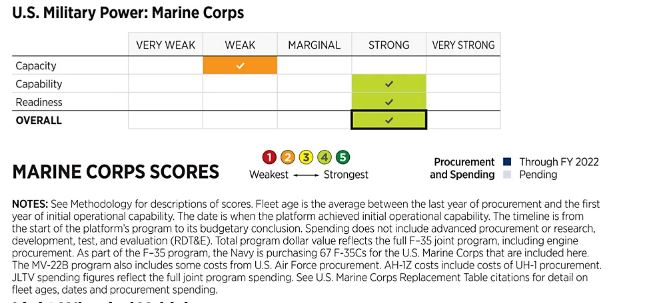
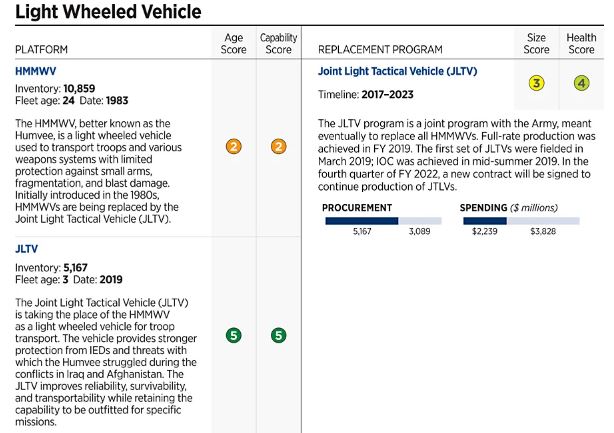
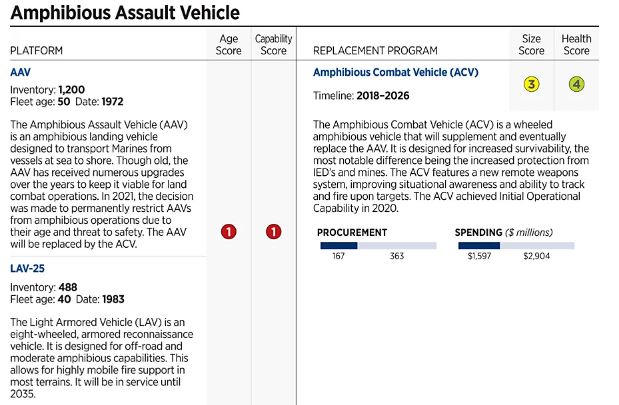

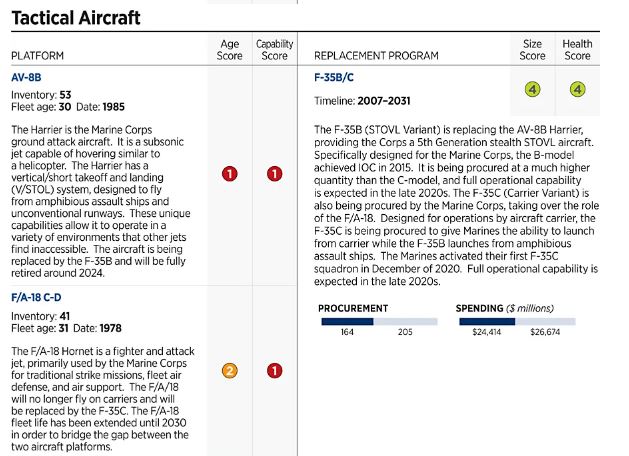
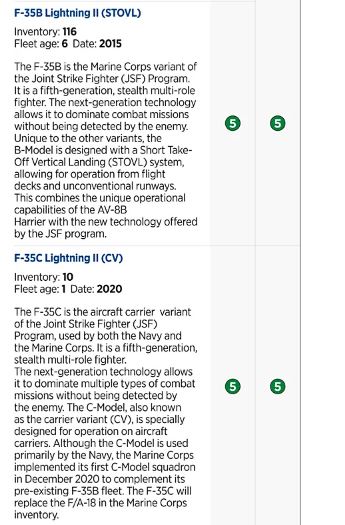
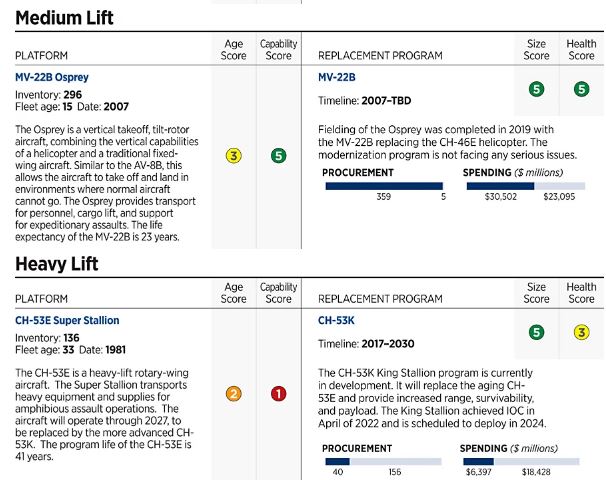
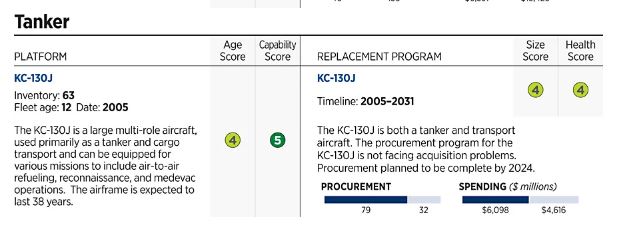
 Geral: https://defesabrasil.com/forum/viewtopi ... 7#p5620737
Geral: https://defesabrasil.com/forum/viewtopi ... 7#p5620737
https://www.heritage.org/military/an-as ... tary-power
https://www.heritage.org/military-stren ... rine-corps








Editado pela última vez por Suetham em Dom Out 23, 2022 4:12 pm, em um total de 1 vez.
- Suetham
- Sênior

- Mensagens: 9638
- Registrado em: Ter Abr 12, 2022 9:10 am
- Agradeceu: 299 vezes
- Agradeceram: 621 vezes
Re: Corpo de Fuzileiros (MUNDO)
https://www.heritage.org/military-stren ... conclusion

The Marine Corps as “Strong.” The score for the Marine Corps was raised to “strong” from “marginal” in the 2022 Index, and it remains “strong” in this edition for two reasons: (1) because the 2021 Index lowered the threshold for capacity from 36 infantry battalions to 30 battalions in acknowledgment of the Corps’ argument that it is a one-war force that also stands ready for a broad range of smaller crisis-response tasks and (2) because of the Corps’ extraordinary, sustained efforts to modernize (which improves capability) and enhance its readiness during the assessed year. Of the five services, the Corps is the only one that has a compelling story for change, has a credible and practical plan for change, and is effectively implementing its plan to change. However, in the absence of additional funding in FY 2023, the Corps intends to reduce the number of its battalions even further from 22 to 21, and this reduction, if implemented, will limit the extent to which it can conduct distributed operations as it envisions and replace combat losses (thus limiting its ability to sustain operations). Though the service remains hampered by old equipment in some areas, it has nearly completed modernization of its entire aviation component, is making good progress in fielding a new amphibious combat vehicle, and is fast-tracking the acquisition of new anti-ship and anti-air weapons. Full realization of its redesign plan will require the acquisition of a new class of amphibious ships, for which the Corps needs support from the Navy.
 Geral: https://defesabrasil.com/forum/viewtopi ... 7#p5620737
Geral: https://defesabrasil.com/forum/viewtopi ... 7#p5620737

The Marine Corps as “Strong.” The score for the Marine Corps was raised to “strong” from “marginal” in the 2022 Index, and it remains “strong” in this edition for two reasons: (1) because the 2021 Index lowered the threshold for capacity from 36 infantry battalions to 30 battalions in acknowledgment of the Corps’ argument that it is a one-war force that also stands ready for a broad range of smaller crisis-response tasks and (2) because of the Corps’ extraordinary, sustained efforts to modernize (which improves capability) and enhance its readiness during the assessed year. Of the five services, the Corps is the only one that has a compelling story for change, has a credible and practical plan for change, and is effectively implementing its plan to change. However, in the absence of additional funding in FY 2023, the Corps intends to reduce the number of its battalions even further from 22 to 21, and this reduction, if implemented, will limit the extent to which it can conduct distributed operations as it envisions and replace combat losses (thus limiting its ability to sustain operations). Though the service remains hampered by old equipment in some areas, it has nearly completed modernization of its entire aviation component, is making good progress in fielding a new amphibious combat vehicle, and is fast-tracking the acquisition of new anti-ship and anti-air weapons. Full realization of its redesign plan will require the acquisition of a new class of amphibious ships, for which the Corps needs support from the Navy.





